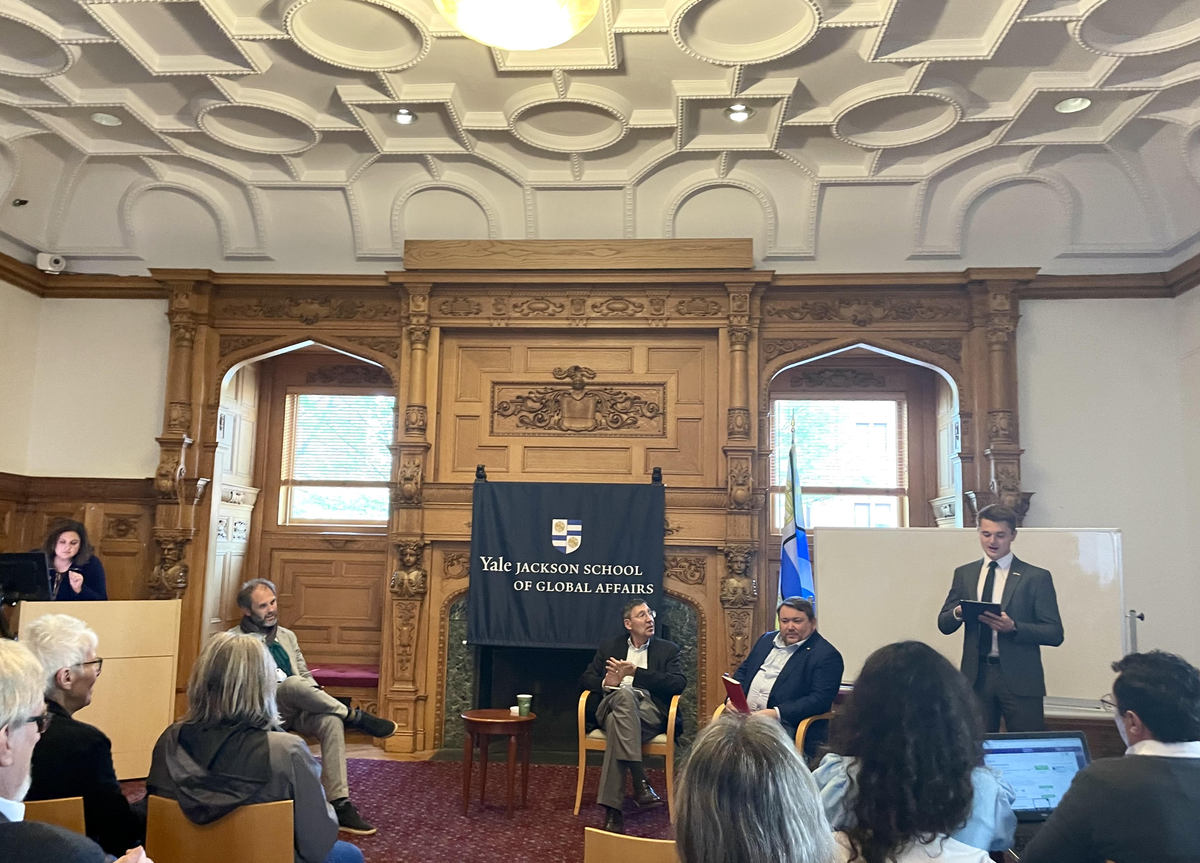Former U.S. ambassador to Ukraine and former governor of Ukrainian Central Bank discuss post-war reconstruction on campus
The conversation, held at the Jackson School of Global Affairs, centered around reconstruction in Ukraine amid the country’s war with Russia.

Esma Okutan, Contributing Photographer
Vladyslav Rashkovan, former governor of the Central Bank in Ukraine, explained that Ukraine’s reconstruction has already started despite the ongoing war.
Rashkovan, who is also an executive board member of the International Monetary Fund, was joined by former U.S. ambassador to Ukraine John Herbst for an April 17 conversation on reconstruction in Ukraine. The panel was sponsored by the Jackson School of Global Affairs, the European Studies Council at the MacMillan Center and the program on Russian, East European and Eurasian Studies at Yale. It was moderated by Marnix Amand, senior lecturer in economics at the Jackson School, who teaches about the economics of the European Union.
“The overwhelming priority is to make sure that Ukraine wins this war,” Herbst said at the Monday event. “What that means is that Ukraine controls its territory and that it has the ability to be prosperous economically, provided that reforms necessary for that prosperity are implemented.”
Rashkovan added that while victory is the priority of the Ukrainian government, this does not mean they have postponed reconstruction. In fact, efforts to rebuild the country are already underway, he said.
From an economic perspective, Amand listed five essential components of reconstruction: capital, labor, technology, institutions and markets. He emphasized that capital surplus has to come from both public and private sources to counteract much of the war damages.
“The World Bank recently made a property damage assessment… that Russia already brought 135 billion dollars in damages to Ukraine,” Rashkovan said. “To compare, Ukraine’s GDP before the war was about 200 billion dollars.”
Rashkovan explained that reconstruction must consider Ukraine’s own vision for its new infrastructure.
For example, he explained that the cost of a destroyed airport in Ukraine is often added to the calculation of the expected cost of reconstruction, even though many airports in Ukraine reflect a Soviet legacy — the necessity of long-distance travel — rather than the needs of current Ukrainians. He explained that instead of just rebuilding infrastructure, Ukraine now has the chance to implement its own vision for its future. For example, they can develop rapid trains between various cities instead of rebuilding all of the destroyed airports.
“One way that the World Bank and the European Central Bank give money is by limiting spending to, say, the building of one airport, to limit corruption and spending,” Amand said. “If they give a big level of money to spend on Ukraine’s own vision it will, in theory, be a much better outcome but there are institutions in Europe that will be suspicious.”
Herbst explained that Ukraine can solve this issue by maintaining substantial control over systems within the country during its reconstruction period, exemplified by its ongoing efforts to restore energy infrastructure and maintain a constant flow of resources.
Rashkovan also noted that a majority of the capital needed for reconstruction will likely come from the private sector and that private capital is already being invested in the country due to a feeling of “national connection.”
He highlighted the vital importance of this shared dedication of Ukrainians to invest in their country for victory and the reconstruction of the state.
“I’ve always been struck by the love of Ukrainians for their country,” Herbst said. “And what we’ve seen since the big invasion is how the best and the brightest in Ukraine have not fled to Europe. They’ve gone to the front. Which by the way, is one of the reasons why Ukraine has used American weapons brilliantly … So all of this makes me optimistic about what will follow once victory ensues.”
Amand and Rashkovan both highlighted the significant opportunity for Ukraine to implement this human capital to modernize and develop its technology as part of reconstruction efforts.
The World Bank estimates the recovery and reconstruction financial needs in Ukraine to be around $411 billion as of March 2023.







